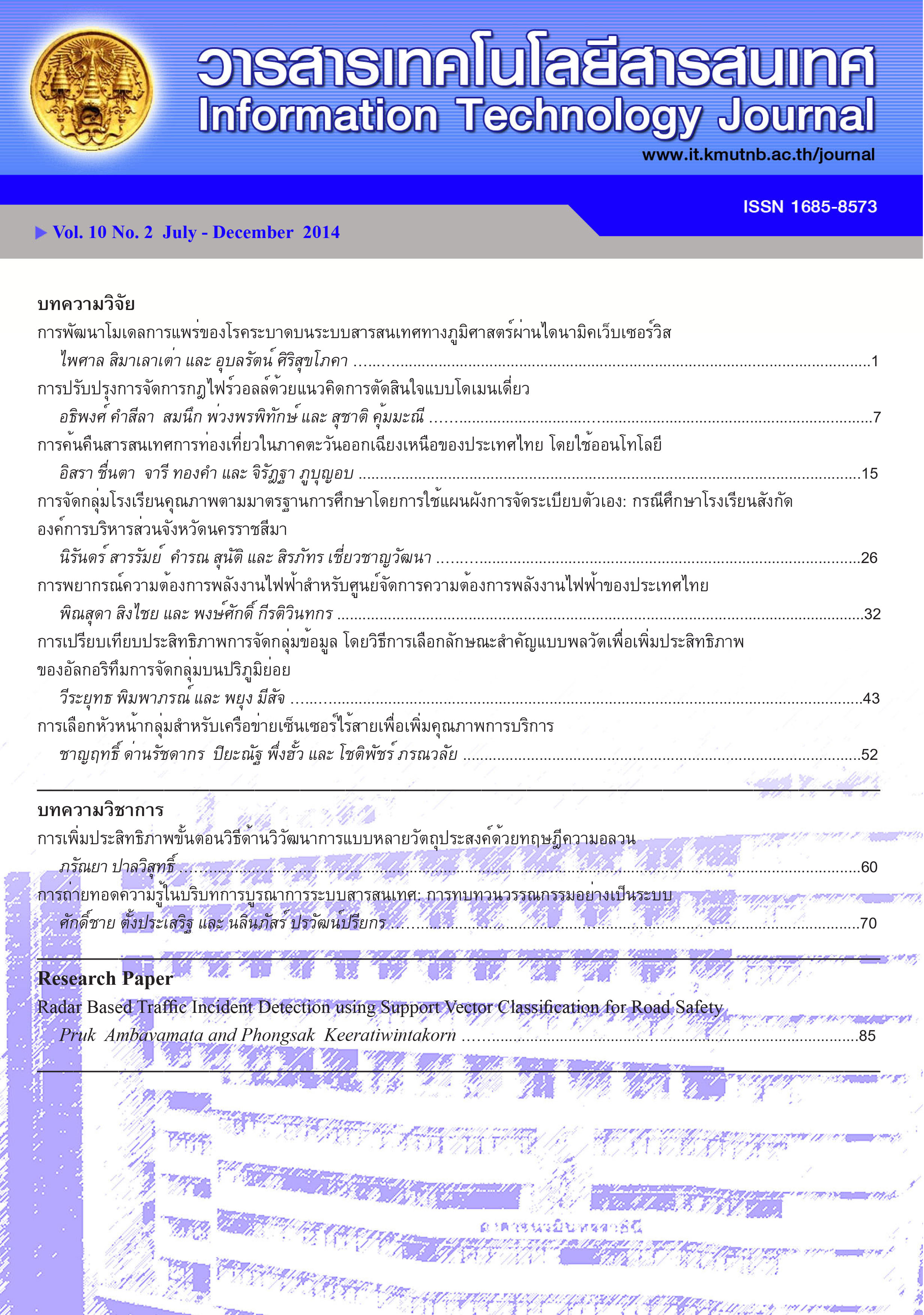การเลือกหัวหน้ากลุ่มสำหรับเครือข่ายเซ็นเซอร์ไร้สาย เพื่อเพิ่มคุณภาพการบริการ
Main Article Content
Abstract
โพรโทคอลแบบกลุ่มที่มีขนาดไม่เท่ากัน ที่มีการอ้างอิง ถึงกันมากได้แก่ [1-2] เกณฑ์วิธีการเลือกหัวหน้ากลุ่มจะ พิจารณาจากพลังงานคงเหลือ (Residual Energy) ของโหนด โดยไม่สนใจว่าโหนดนั้นมีความสำคัญในด้านพื้นที่การ ตรวจจับ (Sensing Area) มากน้อยเพียงใด หากโหนดนั้นๆ ได้หมดพลังงานไป
ความสำคัญในด้านพื้นที่การตรวจจับของโหนดคือ โหนด ที่ไม่มีโหนดรอบข้างซึ่งมีระยะการตรวจจับทับซ้อนกัน (Overlap Sensing Area) หากโหนดนี้หมดพลังงานไปก็จะ เท่ากับว่าเครือข่ายจะสูญเสียพื้นที่การตรวจจับ (Sensing Area) ทั้งหมดของโหนดนั้นๆ ซึ่งแสดงให้เห็นว่าโหนดดังกล่าวมี ความสำคัญมาก ต่างจากโหนดที่อยู่ในพื้นที่การตรวจจับที่มี การทับซ้อนกันมาก หากโหนดดังกล่าวหมดพลังงานไป ก็ยังมีโหนดรอบข้างที่สามารถทดแทนพื้นที่การตรวจจับ ที่เสียไปได้
ผู้วิจัยได้นำเสนอ ความหนาแน่นภายในพื้นที่การตรวจจับ (Density Sensing Area: DSA) ซึ่งเป็นตัวแปรที่บ่งบอกถึง จำนวนโหนดรอบข้างของโหนดใดๆ ว่ามีความหนาแน่น มากน้อยเพียงใดภายในพื้นที่การตรวจจับ ซึ่งใช้เป็นเกณฑ์ ในการตัดสินใจเลือกหัวหน้ากลุ่ม (Cluster Head: CH) ผลลัพธ์ ที่ได้คือโหนดที่มีความสำคัญน้อยจะมีโอกาสเป็นหัวหน้ากลุ่ม มากกว่าโหนดที่มีความสำคัญมาก
จากการทดลองแสดงให้เห็นว่าการนำ DSA มาเป็นเกณฑ์ ในการเลือกหัวหน้ากลุ่มสามารถแก้ไขปัญหาที่กล่าวไว้ข้างต้น สำหรับเครือข่ายที่มีขนาดของกลุ่มไม่เท่ากัน (Unequal Cluster) อีกทั้งช่วยลดพลังงานที่ใช้โดยรวมของเครือข่ายและยังเพิ่ม การครอบคลุมของพื้นที่การตรวจจับ (Coverage Sensing Area) ให้ยาวนานขึ้นส่งผลให้คุณภาพการบริการ (Quality of Service: QoS) ดีขึ้นตามไปด้วย
Cluster Head Selection for Improving Quality of Service in Wireless Sensor Networks
Chanrit Danratchadakorn, Piyanut Pheunghua and Chotipat Pornavalai
Unequal Cluster Protocol for Wireless Sensor Network has a many researches. A protocol that has been proposed and widely referred whose criteria for cluster head selection is mainly considered by Residual Energy of sensor nodes which is not considering in Coverage Sensing Area of network.
A node will be important if it has few adjacent nodes. Therefore, it dies or runs out of energy, network would lose a large amount of coverage area. So the node shouldn’t supposed to be an important node. On the other hand, if the node is dead, adjacent node with overlapping sensing area can compensate for sensing area of dead node instead.
In this paper, we propose and evaluate a Density Sensing Area (DSA) for cluster head selection to improve the coverage sensing area of network. DSA is a variable which computed by each node whether how dense under its sensing radius is. A node with high DSA is not an important node. It has higher probability to be a cluster head than a node with a lower DSA.
Simulation results show that cluster head selection with DSA decreases overall energy consumptions and extends coverage sensing area which can improve quality of service (QoS).


